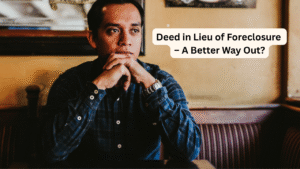 Deed in Lieu of Foreclosure: What Homeowners Need to Know
Deed in Lieu of Foreclosure: What Homeowners Need to Know
Facing foreclosure can be overwhelming, but a Deed in Lieu of Foreclosure (DIL) may offer a way out. This legal agreement allows you to voluntarily transfer your home’s title back to the lender in exchange for being released from your mortgage debt—potentially avoiding the lengthy and damaging foreclosure process. However, it’s not the right solution for everyone. Here’s what you need to know.
How a Deed in Lieu Works
A Deed in Lieu is a negotiated agreement between a homeowner and their lender. Instead of going through foreclosure, you sign over the property, and in return, the lender (usually) cancels the remaining mortgage debt.
Key Requirements:
You Must Be in Default – Lenders typically only consider DIL if you’ve missed payments and can’t catch up.
No Other Liens on the Property – Second mortgages, tax liens, or HELOCs can complicate the process.
The Home Must Be in Good Condition – Lenders may reject a DIL if the property is severely damaged.
You Must Vacate the Home – Unlike some foreclosure alternatives, you’ll need to move out after signing.
Why You Might Need a Deed in Lieu
Avoid Foreclosure – A DIL is less damaging to your credit than a foreclosure.
Faster Resolution – Foreclosure can take months or years; a DIL can be completed in weeks.
Debt Relief (Sometimes) – Some lenders forgive the remaining debt, but others may still pursue a deficiency judgment.
Pros & Cons
Pros:
Less Harmful to Credit – While still negative, a DIL typically hurts your score less than a foreclosure.
Avoids Public Auction – No embarrassing sheriff’s sale or eviction notice.
Potential Debt Forgiveness – Some lenders agree to waive any remaining mortgage balance.
Cons:
Not Guaranteed – Lenders don’t have to accept a DIL request.
Tax Implications – Forgiven debt may be considered taxable income by the IRS.
You Lose the Home – Unlike loan modifications, you can’t keep the property.
Possible Deficiency Judgment – Some lenders may still sue for the difference if the home’s value is less than the loan balance.
Should You Pursue a Deed in Lieu?
A Deed in Lieu can be a smart alternative to foreclosure, but it’s not the only option. Before proceeding:
1. Talk to Your Lender – Ask if they accept DIL agreements and under what terms.
2. Consult a Housing Counselor – HUD-approved agencies offer free foreclosure prevention advice.
3. Explore Other Options – Loan modifications, short sales, or bankruptcy might be better solutions.
If you’re out of options and want to avoid foreclosure’s worst effects, a Deed in Lieu could be the right choice—but always get legal or financial advice before signing anything.
Need help? Contact a foreclosure attorney or HUD-approved housing counselor to discuss your situation.
Always make sure you consult a legal expert before you put pen to paper on any deal regarding your home and finances